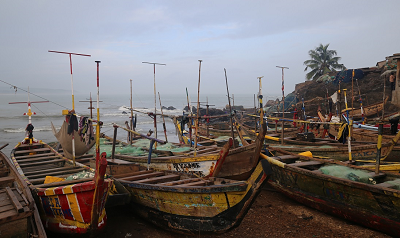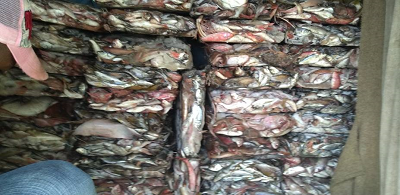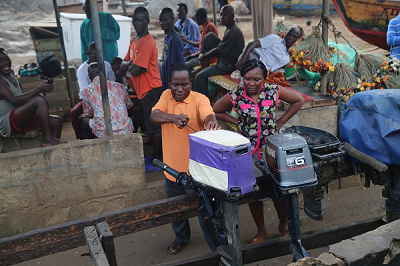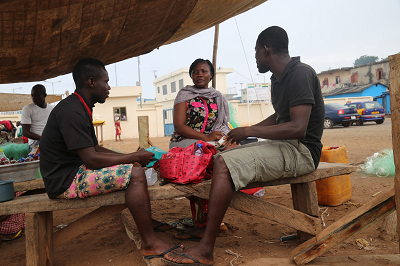
Saiko’s Scourge, A Fight That Must Be Won
Young fishermen sat at the Elmina beach with confusion written on their faces, their jaws resting in their palms. The quiet atmosphere on the once busy shore at this time of the year, their bumper season; echoes the gloomy story of the fishermen and their communities.
The young fishermen said they were afraid to go home. They have been at the beach for days and gone on several fishing expeditions but their nets have come back from sea continuously empty; sometimes destroyed by activities of recalcitrant vessels who invade their space.
They are the bread winners. Many others depend on these young men for their livelihoods. Now Emmanuel Cobbinah and Meshach Amos Bassaw would rather not go home.
“I have a wife, two children, aged parents and seven other siblings who depend on me one way or the other. I cannot go home with empty hands and excuses. The sea is indeed dead and our lives hang in uncertainty,” Bassaw said.
Others would rather not speak. They mend their torn nets in a silence that echoes the woes of a dying fishing industry.
Advertisement

They are not in this situation alone. About two million Ghanaians depend on the sea for their livelihoods. Now many of these suffer the same fate; the outcome of a dying and over-exploited sea. The tattery it has steadily left behind in the communities whose livehoods depend on it resonates along Ghana’s coast.
In interviews, the fishermen express their helplessness and look on as a heritage left by their fathers and which has kept families sustained for years gradually becomes extinct before their eyes.
Cobbinah and Bassaw lay the blame of the bad state of the fishery resources at the doorstep of saiko.
They said the Ministry of Fisheries and Aquaculture Development must rise to fight to redeemed the fishing industry from the grip of the saiko dealers.
What is Saiko?
“Saiko” is used among fisher communities to refer to the transfer (or “transshipment”) of frozen blocks of fish from industrial vessels to canoes at sea.
The Saiko business has grown over the years from something insignificant to a calculated, well-organized illegality.
Despite rumours of its anticipated legalization, officer of the Fishing enforcement Unit say they have not received an directive saying saiko has been legalized. “We are doing our work and would arrest anyone found to illegally transship at sea,” one of them said.

The lucrative nature has attracted a group new kind of “fishermen” who go to sea with no nets. People who are even not fishermen have been attracted to the business. These new “fishermen” take large canoes –designed specifically for the saiko trade – to transact business with trawlers on the sea. They buy large quantities of by-catch from these vessels, often comprising illegally caught small sized fishes.
This by-catch business has gradually grown into a main trade and once there was a market there was a motivation to continue.
The vessels come too close to shore destroying the nets and gear of artisanal fishermen taking fish from their space and depriving them of their catches.
Illegality
“Saiko” is deemed illegal and prohibited under the Fisheries Act 625 of 2002 (Section 132), and the Fisheries Regulations 2010 LI 1968 (Regulation 33), but the business has grown due to its lucrative nature.
The Ministry of Fisheries and Aquaculture Development in years past has on several platforms expressed worry about vessels venturing into the fishing space of artisanal fishermen and destroying their gear in the process.
The ministry since 2018 asked all vessels to declare their by-catch under special supervision at the Tema port as a measure to control the activities of the vessels.
It also deployed observes onboard trawlers since 2018 to help curb the saiko business on the high seas.
Indeed, if vessels use the right gear and do what is lawful they are not likely to get these by-catches.
But fishermen at Elmina and other fishing communities say the vessels do not stick to the rules of the game.
“How do we get fish when these vessels come so close to shore and into our fishing space for fish,” Cobbinah queried.
Fishermen say this has helped to a point but noted that allowing vessels to bring in saiko fish at Tema will not help. “It’s a motivation for vessels to catch fish meant for artisanal fishermen. It’s a legalization of saiko,” one fisherman added.
They acknowledged the work of the ministry which had drastically reduced transshipment at sea but said the ministry must be careful not to legalize the business.
In August 2018, a vessel carrying slabs of illegally transshipped “saiko” was impounded at Apam in the Central region.
The impounded fish included 215 slabs and 15 sacks of fish mostly juvenile fish. This is worrying and tells the illegality is happening.
The dread
The business is a dreaded area. In some communities it is discussed in whispers. Indeed the Deputy Minister of Fisheries, Mr Ato Cudjoe alleged that some people purporting to be engaged in the saiko business had threatened him warning him to stay off the saiko business.
Impact on the Country
As the saiko business grew so did the economic impact of saiko on the country, adversely affecting every life connected to the fishing industry. The impact was enormous.

According to a report by the Environmental Justice Foundation (EJF) and Hen Mpoano, an estimated 100,000 tonnes of fish were landed through saiko, 80,000 tonnes of which were landed in the Central region port of Elmina alone in 2017.
The estimated value was between US$34-65 million.
But saiko fish is unreported and represents a loss of revenue to the state.
Illegal, unreported and unregulated (IUU) fishing disrupts protection and management actions presently in place in many countries.
Indeed, IUU is noted as a grave threat to the sustainability of capture fisheries due to its adverse effect on the ecosystem of the oceans and economy of fishing nations.
Huge quantities of juvenile fish are caught and iced by these industrial vessels and transshipped for sale affecting fish stocks significantly and particularly artisanal fishing.
So what happens is artisanal fishermen invest in fuel and other fishing inputs and go to see but their space and catch virtually nothing because industrial vessels now compete with artisanal fishermen for catches of small pelagics such as sardinella, anchovies and mackerel, the staple food of local communities.
The Fisheries Scientific and Technical Working Group also indicated that the small pelagic stocks could collapse entirely by 2020 if nothing drastic is done to restore stocks.
Global losses due to IUU fishing alone are estimated at between US$10 billion and US$23.5 billion per year, with West African waters believed to have the highest levels of IUU in the world, representing up to 37 percent of the region’s catch (Organization for Economic Cooperation and Development, 2012).
Much of the IUU fishing in the region is believed to be conducted by foreign vessels fishing in the Exclusive Economic Zone (EEZ) of coastal West African States including Ghana.
The Consequences for Communities
The consequences of saiko have been enormous particularly for artisanal fishermen and their livelihoods.
So artisanal fishermen go to sea and come back with empty nets, leaving them poorer.
Cobbinah said life for him as an artisanal fisherman is becoming worse.
“Officials should do more to totally stop ‘saiko’”, he stated.
“Usually at this time of the year I would not be here. I would be at sea and when I come I will come back with fish. Now I sit here not knowing how to get my life going. I don’t know what the future holds, this must stop somewhere,” he added.
Bassaw chipped in his comments. “We took loans to repair our canoes in anticipation for the bumper season but this has not been so in the past few years. There is no bumper season. It is worrying for us and the people who depend on us.”
Fishermen are not the only people affected.
Drivers, petty traders and many other businesses in fishing communities are linked to the fishing trade and its collapse directly impacts all these other activities.
Papa Kweku Yao repairs outboard motors used on canoes for fishing at Moree. His business is collapsing, he says. “My business is now down. I was repairing outboard motors consistently and earning some good money but now there are virtually none to repair. Canoes are not being used. No spoilt outboard motors to repair. Life has just become too difficult for us in the fishing communities,” he stated.
Vanishing Heritage
Fishing is a tradition. The way of life of coastal communities and elders in these communities fear for their livelihoods and the future of the young ones.
In Moree, oldies who had fished in times when the sea was healthier and magnanimous with the people that fed on it sat and reminisced the “good old days” under a shed at the beach.
Opanyin Kwadwo Krampah spoke on behalf of the retired fishermen. “We are worried. We didn’t know about saiko in our days. We did things right. We don’t have long to live but I am afraid for these young fishermen. It’s a bad story now.
Our women don’t get fish to process. The ovens are empty and life is hard,” he stated.
Migration
“Many, especially the young men, are leaving the town to Ivory Coast where fishing is now more lucrative. Once the sea is dead, the communities are also gradually dying,” Opanyin Krampah stated.

Madam Agnes Thompson, a teacher at Apam said the migration was affecting families and the education of young pupils in fishing communities.
Mr Emmanuel Eric Quaye is a retired pharmacist and lives at Apam in the Central region. He said his investments in fishing had gone down the drain.
He has been investing in fishing expeditions for many years and gets profits. In the past few years, it has been losses he said.
Another person, a teacher at Apam who wanted to remain anonymous said “saiko” must be totally stopped and then we can talk of restoring the stocks. Until then we should forget about talks of restoring the fishery stocks. “If we can get fresh fish to buy from our fishermen why buy iced fish slabs” she asked.”
A Fresh Fight
With a renewed mission to restore fishery stocks, the Ministry of Fisheries and Aquaculture Development (MOFAD) and the Fisheries Commission are working extra hard to nip the practice in the bud.
The MOFAD has since the beginning of 2018 taken some steps to ensure that no fish is illegally transshipped at sea.
The Head of the Marine Fisheries Management Division of the Fisheries Commission, Mrs. Matilda Quist said the ministry had deployed observers onboard trawlers to help curb the transshipment at sea.
She said there had been regular sea patrols by the Ghana Navy to check such operations at sea.
The Fisheries Enforcement Unit (FEU) she noted was also working to seize and arrest saiko fish and offenders.
“Complaints from communities that they are not getting “saiko” fish is an indication there have been some successes,” she stated.
She stated that the Ministry would adequately resource the FEU to work to curb the practice.
Our coastal communities are struggling. Their livelihoods threatened. The fight to stop all forms of illegal, unreported and unregulated fishing practices must continue unabated.
Government and agencies in charge of the fisheries must work harder to ensure an end to “saiko”. The negative impact of saiko has been immense.
This two-lettered sentence must guide this nation in managing our resources and “If it is to be it is up to us.”




